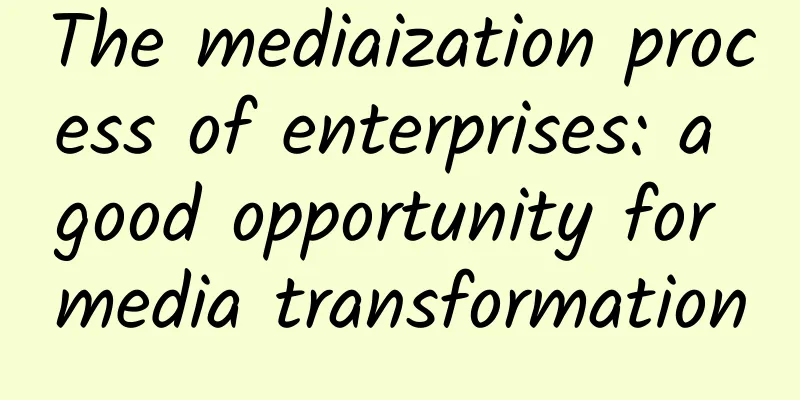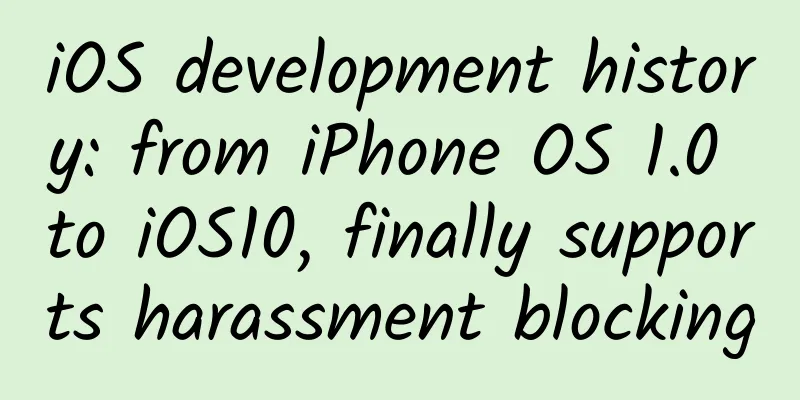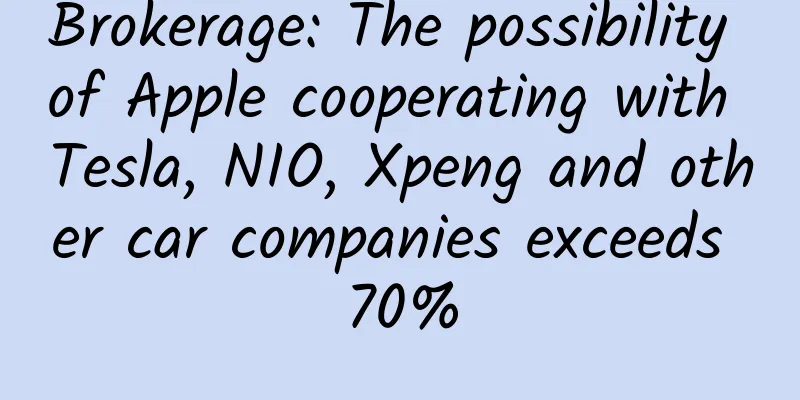The mediaization process of enterprises: a good opportunity for media transformation

|
Chen Tong's resignation caused quite a stir in the media circle, and later there was a lot of noise about where he was going. But a few days ago, the dust finally settled and Chen Tong went to Xiaomi. Oh, it's Xiaomi. Finally I understand why it is so lively. As long as it is related to Xiaomi, it will always be a hot topic. Therefore, if we say that Xiaomi is a technology company, it is better to say that it is a "media" company that is accustomed to marketing. Therefore, it seems that it is true that media people go to Xiaomi. But the problem is that Xiaomi is a hardware company after all. Why did Chen Tong go to a hardware company? Many people think that it is to complete Xiaomi's "hardware + content" model, and the focus is on building Xiaomi's content ecosystem. Although this understanding cannot be said to be wrong, it may not be the ultimate way for Xiaomi. In fact, it is more accurate to define Xiaomi as "hardware + media" rather than "hardware + content". However, whether it is "content" or "media", the ultimate service is still the hardware business itself, especially when "new hardware" is still in the early stages of the industry and is likely to become the engine of the global economy in the future. So, when it comes to assuming the responsibility of serving hardware, which one is more advantageous, content or media? Although the media is losing its ability to serve as the gatekeeper of the commercial market, it is still the most powerful marketing position and sales force, both at this stage and in the foreseeable future. Especially in the face of the complex media environment in the future, marketing is becoming more and more difficult, marketing costs are increasing, competition is becoming more and more fierce, and product cycles are becoming shorter and shorter. The marketing advantages of companies with a high degree of mediaization can help products enter the mainstream market and form certain product advantages. Even if you use your toes to think, you can understand that this must be the ability that Xiaomi needs. However, content itself cannot fully assume the responsibility of marketing, and even needs to be carried by the media. So although Chen Tong is apparently working on content, it is better to say that content management is just the starting point of Xiaomi's mediaization process. With media advantages and the media value that may be generated in the future, Xiaomi, as a hardware company, has more price advantages and added value advantages compared to pure hardware manufacturers. Therefore, the mediaization of enterprises has a certain general correctness. However, the enterprise media attributes we mentioned before are often the pan-media attributes brought about by the introduction of Internet technology into enterprises, not professional media. Xiaomi's introduction of Chen Tong may mean that the company has begun to seriously consider how to move from having pan-media attributes to becoming a professional media, and the completion of this media role needs to be beneficial to the development of the enterprise, and even become a huge driving force for the development of the enterprise. The media can take on the responsibility of corporate mediatization Well, a very interesting proposition is, as this trend develops and the mediatization process of enterprises really gradually becomes the mainstream market behavior, why can't the media industry, which has been struggling for business models and profits at this stage, go with the flow and make corresponding contributions and services to help the mediatization process of enterprises? Even if we use a very inappropriate example, if the enterprise needs to produce content and edit, then outsourcing to the media is not necessarily impossible. In the process of enterprise mediatization, the media should be able to meet the various needs generated. Then, for the media, new business opportunities may gradually emerge with the development of this form. And can this new opportunity become a panacea to save the media industry from its decline? If the media can indeed contribute to the mediatization of enterprises, does it mean that the current business logic of the media industry needs to be readjusted, that is, the media should think about how to serve enterprises in the process of mediatization? Therefore, the media needs to have an in-depth understanding of the industry it serves, and even know how to operate it, before they can tell companies what media attributes to shape, which is conducive to helping companies gather attention and even achieve user management and conversion. In particular, how to use content to gather attention and shape media attributes is undoubtedly the strength of the media, so in this regard, the media can do something. The advantage of this approach is that, because the enterprise itself has strong media attributes, if the content is constructed reasonably and the construction of media attributes is in line with the enterprise attributes, then after users are attracted to the enterprise position, the conversion rate will inevitably be much higher than when users gather at the media position and then divert to the enterprise. Moreover, this kind of traffic does not require complex filtering and can even achieve multiple conversions. This is what Xiaomi has been trying to do. To put it more broadly, this form has always existed. For example, a company sets up its own official website and then imports the purchased traffic. After the user enters the official website, he decides whether to purchase based on his needs. Of course, this method is extensive, and the traffic is often one-time, with a very high loss rate. Moreover, for the company itself, apart from the marketing effect, there is not much gain in other aspects. But in the future, this approach may be upgraded to the point where the official website becomes a media, and traffic no longer needs to be purchased. Through media construction, traffic can be attracted. At the same time, with more and more attention paid to content construction, there will be great gains for brands, products, word of mouth, and related aspects. This is also the part that media is best at. Therefore, let's call this change "the media evolution of enterprises." This seems a bit like what Chen Tong is trying to do at Xiaomi, except that, compared to Chen Tong, media as an institution should have more advantages. So I wouldn’t be too surprised if someday media practitioners and companies work together to develop certain corporate strategies. "Noble" news is not the whole of the media However, once the media exists as a service provider of the commercial market and completely turns to the market, the "media industry" in the current legal concept will disappear. In other words, the media industry can sell itself to enterprises in order to make money, and even abandon the concept of chastity. So is it okay to be a "prostitute"? Of course, if the media industry has a concept of chastity, it is largely given by "news". But if other parts of the media can make money, news can avoid the responsibility of making money, and independence will not be lost. Therefore, if the news is to stay in the media and rely on the money earned by the media to survive, then the news can continue to be "aloof and arrogant", but in order to ensure the independence of the news and nourish the media with the influence brought by this independence, the media must be separated from the news, so the internal institutional reform of the media industry may be far greater than the external exploration of media forms. If it is feasible, then it is okay to let the "media" continue to degenerate and corrupt. Let the rotten become more rotten, and let the noble become more noble. It's just that nobility also needs to be rooted deep in the rotten soil. As a winner of Toutiao's Qingyun Plan and Baijiahao's Bai+ Plan, the 2019 Baidu Digital Author of the Year, the Baijiahao's Most Popular Author in the Technology Field, the 2019 Sogou Technology and Culture Author, and the 2021 Baijiahao Quarterly Influential Creator, he has won many awards, including the 2013 Sohu Best Industry Media Person, the 2015 China New Media Entrepreneurship Competition Beijing Third Place, the 2015 Guangmang Experience Award, the 2015 China New Media Entrepreneurship Competition Finals Third Place, and the 2018 Baidu Dynamic Annual Powerful Celebrity. |
<<: Behind the recall: Who is hacking the iPhone 6 Plus?
>>: China's communications manufacturing industry needs 5G standards
Recommend
Social experience practical case! How is the QQ group used by hundreds of millions of people designed?
"Groups are the core of social life and they...
Brand marketing and promotion, how to capture the young group?
In May, which is Mental Health Month, Burger King...
What should I do if I am a leader for the first time and am responsible for promoting a product?
So how do we implement this comprehensive operati...
How can products improve user stickiness? Here are 3 tips
These people used to be our customers, but they d...
The best eye protection product for children is free?
I don't know if you noticed. Are there more a...
Autonomous driving is just a story for Didi, not reality
Didi’s “big transportation” story may have been t...
Channel promotion skills and conversion rate optimization solutions that money can’t buy
Today, I will share with you a few points mainly ...
Why do I always feel my phone ringing? Is it an illusion? The truth is not simple
This article was reviewed by Dr. Tao Ning, Associ...
How can a barber shop make money with mini programs? How can a barber shop make appointments with mini programs?
Due to the impact of the epidemic, all walks of l...
Starting from the death of Lashou: Is group buying O2O the next way to play?
Lashou.com, a group buying website that once had ...
From 0 to 1, how to build a ToB market operation system? (Down)
Nowadays, ToB plays an increasingly important rol...
Xi'an's unique men's sauna club, come and experience it with curiosity
Xi'an Bath Club East Suburbs, South Suburbs, ...
The world has begun researching 6G, 100G/s! Deployment will begin in 2030
[[265644]] According to the 21st Century Business...
How to avoid fake influencers in overseas influencer marketing?
Influencer marketing is currently the main means ...
The lunar code hidden in the first batch of samples of Chang'e 5
In December 2020, my country's first lunar sa...









